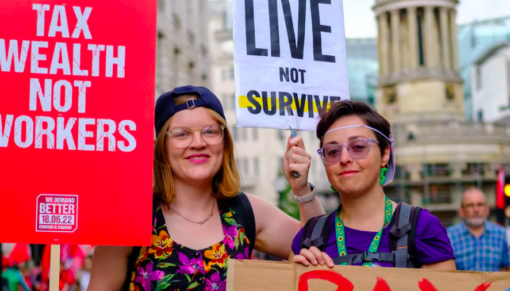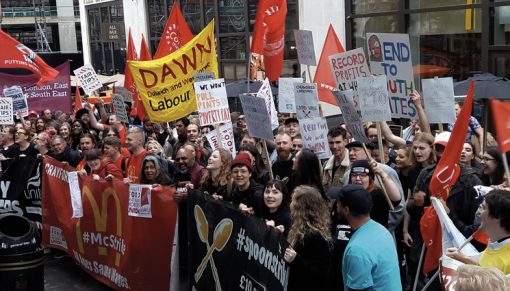Climate Action and the Mobilisation of Young Workers are Two Sides of the Same Coin
January 21 2022
Throughout November, the National Young Workers Committee were thinking about various issues that impact young workers as part of Young Workers Action Month. In this blog, committee member, Laura Marshall, explores the challenges young workers face in the workplace and wider society, due to the hegemony of neoliberalism. Together, we will also consider the ways in which the trade union movement and the environment have similarly been harmed by the dominant ideology. Furthermore, we will contend that young workers and young environmentalists have a shared injustice and political interest that could be harnessed by the trade union movement.
Since the 1980s the United Kingdom has been infected by globalised markets, privatisation and austerity. Privatisation has ravaged public services and job security; as well as destroyed the right to housing. Working people have been forced to compete for labour to be able to afford to buy a property. Those who own property are then pushed to exploit other working people through high rent, due to a lack of social security. The privatisation of unionised industries means that workers are at risk of the gig economy, which further encourages a dog-eat-dog mentality and breaks down the collectivism necessary to unionise. In turn, the gig economy promotes the use of disposable contracts that generate infinite GDP growth and consumption. Subsequently, this leads to overconsumption which is harmful to the environment and endangers the future of the next generation.
Thatcher was right in thinking neoliberalism would foster self-interest, as this can be seen today in the housing crisis, the rise of the gig economy and climate change. Young workers are especially affected by these issues as they struggle to avoid ecological catastrophe, find secure employment, pay high rent, and attempt to save a deposit for a house (all at the same time). Nevertheless, paradoxically young workers are seemingly less likely to become a member of a trade union, why is this?
We ask ourselves the following questions: is it because young people are conditioned by individualism and consumerism on social media platforms? Or because they have been excluded from political consciousness raising in universities, due to the marketisation of higher education? Or could it be that society is lacking a belief system?
The pandemic highlighted major flaws in the ideology of neoliberalism in terms of the deforestation and globalisation of the planet that helped to cause and spread Covid-19. The harms associated with precarious labour and the advantages of an adequate social security system were also made clear by the amount of people who accessed universal credit and emergency housing. In addition, after decades of decline, union membership increased due to job insecurity and health and safety risks associated with the virus.
Moreover, privatised public services (including the postal and telecom industry) were rightfully recognised for the vital provision they provide to communities every day. The Pathway to Change Agreement won a shorter working week for postal workers and in some offices saw the introduction of a four-day working week. The agreement also empowered management and union representatives to make industrial decisions at the local level. A four-day week not only improves the work life balance of our members (who are earning a real living wage), it also helps to reduce carbon emissions which is beneficial for the environment. Similarly, localism ensures labour is organised in the interests of the workers on the shopfloor and promotes sustainable growth through the management of resources from the ground up.
Workers have traditionally been excluded from environmentalism as the cause has been reserved for those who have the freedom to worry and protest about existential threats (outside of paying the bills and meeting their basic needs). Greener living has been sold as a trendy lifestyle, with responsibility for the environment devolved onto individuals through recycling and eating less meat, rather than the issue being recognised as a collective threat that requires structural change.
Nevertheless, environmental protest groups have succeeded in raising awareness about the climate emergency over the last few years and have been very successful in mobilising younger people. Perhaps the nihilism of the existential crisis has ironically provided young people with something to believe in? Yet, in the absence of a social democracy the hope of young protesters has been demonised by the right-wing media and curtailed by the anti-protest bill. That said, perhaps younger people would be better placed tackling environmental issues in the workplace where real change can be made?
The pandemic has proven that trade unions and climate activists share the same fundamental values in terms of sustainability and collectivism. However, protecting the environment within the structure of neoliberalism is arguably rooted in the mobilisation of workers and organised labour. The crisis highlighted the power that trade unions have to collective bargain in workplaces to implement changes that not only improve working conditions for workers, but also help to protect the planet.
Trade unions could collaborate with environmental protest groups on a political strategy that is mutually beneficial and encourages young activists to join a union. The coalition could potentially grow the trade union movement, help unions to recruit more politically minded young people, improve working conditions and protect the planet.




































































